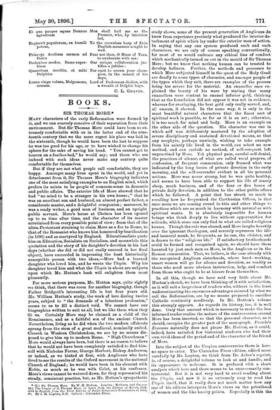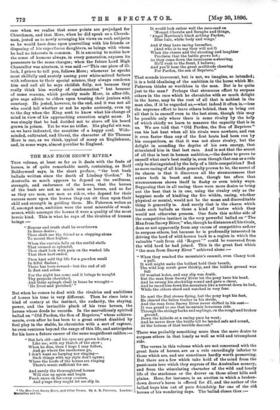BOOKS.
SIR THOMAS MORE.* MANY characters of the early Reformation were formed by it, and we can scarcely conceive of their separation from their -environment. But Sir Thomas More could have been so ex- tremely comfortable with us in the latter end of the nine- teenth century that we the more regret his place was laid in the sixteenth, though he would have been the last to suppose tie was too good for his age, or to have wished to change his sphere for the sake of saving his head. "You cannot get to &amen on a feather-bed," he would say; and those who are imbued with such ideas never make any century quite
,comfortable for themselves.
But if they are not what people call comfortable, they are 'happy. Amongst many lives spent in the world, and yet in detachment from it, Sir Thomas More's biography indicates one of the most satisfying examples to an English mind, which prefers its saints to be people of common-sense in domestic -and public affairs. The exterior life of More showed that he had "no mind to be a stranger in his own house ; " that he was an excellent son and husband, an almost perfect father, a ?considerate master, and a delightful companion ; moreover, he was a ready writer, a good man of business, and an upright public servant. More's house at Chelsea has been opened up to us time after time, and the character of its master scrutinised from every possible point of view; from that of the ultra-Protestant straining to claim More as a foe to Rome, to that of the Romanist who knows him honoured by beatification (in 1886) and as martyred by England. Educationalists quote 'him on Education, Socialists on Socialism, and meanwhile this quotation and the story of his daughter's devotion in his last -days (whether she did or did not really succeed in her final 'object), have succeeded in impressing the least historically susceptible person with two ideas,—More had a learned daughter who loved him, and he wrote the Utopia. Why his daughter loved him and what the Utopia is about are subjects ?apon which Mr. Hutton's book will enlighten them most pleasantly.
For more serious purposes, Mr. Hutton says, quite rightly we think, that there was room for another biography, though Father Bridgett's interesting life is but four years old. Mr. William Hutton's study, the work of love during twelve years, subject to "the demands of a laborious profession," seems to us to fill a distinct void. We cannot have our biographies written to suit us all, but we like them when they ft us. Certainly More may be claimed as a child of the Renaissance, and as a faithful son of the ancient Church Nevertheless, living as he did when the two modern offshoots sprang from the stem of a great mediEeval, nominally united, Church in Western Christendom, we are by no means dis- posed to give him up to modern Rome. "High Churchman" More would always have been, but there is no reason to believe that he would not have been completely satisfied to find him- -self with Nicholas Ferrar, George Herbert, Bishop Andrewes, -or indeed, as we hinted at first, with Anglicans who have lived to see the results of the Oxford movement in the national Church of England ; he would have been in his element with Keble, as much as he was with Colet, as his confessor. More's views cannot be watered down, for they represented his steady, consistent practice, but, as Mr. Hutton's sympathetic • (I.) Sir Thomas Hors. By W. H. Hatton. London : Methuen and Co.— (2.) The Utopia of S. Thomas Mar., in Latin from the Edition of March, 1618, and in English from the First Edition of Ralph Eotrynson's Translation in 1661, Jo. By J. H. Lupton. B.D. Oxford : Clarendon Press. study shows, some of the present generation of Anglicans do know from experience precisely what produced the interior de- tachment of spirit which lay under the exterior man of action. In saying that any one system produced such and such characters, we are only of course speaking conventionally, for most of us would embrace any ethical line of conduct which mechanically turned us out in the mould of Sir Thomas More ; but we know that nothing human can be trusted to develop holiness. Further, the methods and processes to which More subjected himself in the quest of the Holy Grail are deadly to some types of character, and amongst people of the types which they snit, there are examples of the process being too severe for the material. An enameller once ex- plained the beauty of his ware by stating that many enamellers were content to enamel inferior gold, thinking ?that as the foundation did not appear it was not in evidence, whereas for overlaying, the best gold only really served, and, all unseen, it showed. In the same way, it is only in the most beautiful natural characters that the finest sort of spiritual work is possible, so far as it is an art; otherwise, it is too much for mind and body. More is an example on the other side of the question. His character was one in which self was deliberately mastered by the adoption of severe disciplinary and sustained devotional means, so that any neophyte, perhaps unwisely, wishing to take example from his saintly life lived in the world, can select no new method, and can exclude no method, of self-conquest left unpractised by More. Yet physical pain, careful self-denial, the practices of silence, of what are called vocal prayers, of confession, of frequent communion, only framed what was indicated by the long hours of private devotion in the early morning, and the self-surrender evident in all his personal actions. More was never strong, but he was quite healthy, and seems to have been able to support his life or scanty sleep, much business, and of the four or five hours of private daily devotion, in addition to the other public offices which he followed. A point that has struck no much in recalling how he frequented the Carthusian Offices, is that once more we are coming round in this and other things to practices which are as much in harmony with natural as with spiritual wants. It is absolutely impossible for human beings who think deeply to live without opportunities for solitude, which some can only find in what are called religious houses. Though the rule was abused, and More laughs heartily over the ignorant theologian, and severely reprooves the idle and immoral monk, he frequents, as he can, the cloister, and is drawn to the "religious life." If satisfactory brotherhoods could be formed and recognised again, we should have them haunted by just such men as More, in the Anglican as in the Roman communion. That, we believe, is the case already with the recognised Anglican sisterhoods, where hard - working, smart women will go for silence and devotion, as readily as those who need more obvious instruction, help, and comfort from those who ought to be at leisure from themselves.
In all this, though we have said very little about Mr. Hutton's sketch, we have been thinking of it with satisfaction, as it will suit a large class of readers who, without in the least underestimating the enormous advantages secured by what we call the Reformation, are by no means prepared to sacrifice Catholic continuity needlessly. In Mr. Hutton's volume this strongly appears. As regards its history, too, it is well done. Only that amount which is necessary to make the less informed reader realise the nature of the controversies around More has been inserted, so that the personal character, as it should, occupies the greater part of the monograph. Fronde's Erasmus naturally does not please Mr. Hutton, as it could, indeed, have satisfied few historical students who had their own vivid ideas of the period and of the character of the friend of More.
Into the subject of the Utopian controversies there is here no space to enter. The Clarendon Press edition, edited most carefully by Mr. Lupton, we think from Dr. Arber's reprint, is, of course, a delightful volume to look at and handle, and
its appearance is welcome. It is prefaced with a short analysis which here and there seems to be unnecessarily con- troversial. But it is not very hard to avoid reading about the Utopia, and now it is so extremely easy to read the Utopia itself, that it really does not much matter how any one of his editors interprets More's views on the priesthood of women and the like knotty points. Especially is this the case when we realise that some points are prejudged for Churchmen, and that More, when he did speak as a Church- man, jested as to newly arranging his views on such subjects as he would have done upon quarrelling with his friends or disposing of his superfluous daughters, as beings with whom he had no interests in common. It is amusing to notice how the sense of humour always, in every generation, exposes its possessors to the same charges; when the future Lord High Chancellor was nineteen, it was said :—" This one piece of ill- lack, I grieve to tell you, follows More; whenever he speaks most skilfully and acutely among your white-mitred fathers with reference to their special science, they always condemn him and call all he says childish folly, not because they really think him worthy of condemnation" but because of some reasons, which probably made More, in after-life, give sage advice to elders upon treating their juniors with. courtesy. He jested, however, to the end, and it was not all who could tell whether or not he spoke seriously, even up to the day when the King sent to know what his change of mind in view of his approaching execution might mean. It was simply that he had decided not to shave off his beard grown in prison. Yet be was no trifler. His playful wit was, as we have indicated, the sunshine of a happy soul. Wide. minded, cultivated, and liberal, the character of Sir Thomas More is one, as we think, typical of many an Englishman, and, in some ways, almost peculiar to England.



































 Previous page
Previous page